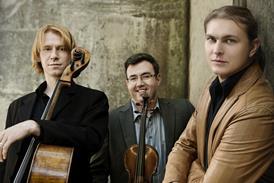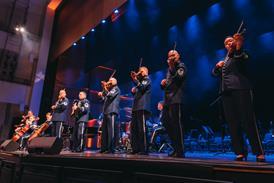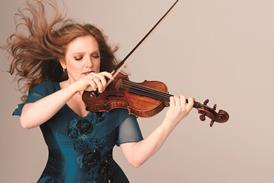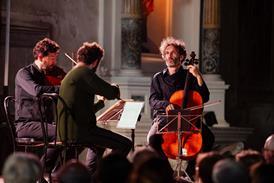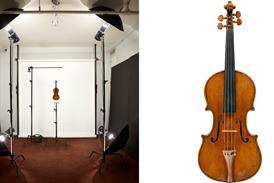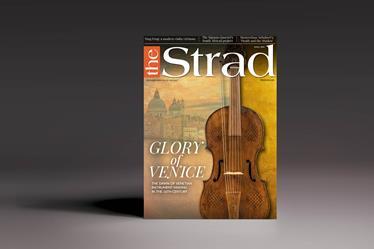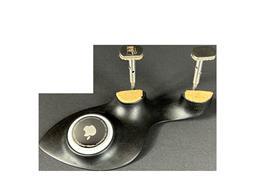All Lutherie articles – Page 3
-
 Premium ❘ Feature
Premium ❘ FeatureEarly lutherie experience: The journeyman years
The time spent between finishing at violin making school and striking out on your own can be critical to a luthier’s learning experience. Peter Somerford finds out what makers should expect from their first jobs in a workshop – and how they can make the most of their time
-
 Focus
FocusVuillaume’s ‘Alard’ bows: Small but beautiful
In the extensive literature concerning Jean-Baptiste Vuillaume, there is very little about one of his more remarkable innovations: a refinement of the bow frog design that can be seen on many examples from his workshop. Michel Samson explains how the so-called ‘Alard’ bow was designed to make life easier for ...
-
 Premium ❘ Feature
Premium ❘ FeatureWood treatment: The magic touch
New research has revealed how Stradivari, Amati and Guarneri ‘del Gesù’ all used tonewood that had been heavily treated with chemicals prior to carving. Wenjie Cai and Hwan-Ching Tai explain the study’s findings, and suggest it could indicate that the Cremonese makers were influenced by the contemporary alchemical beliefs
-
 Premium ❘ Feature
Premium ❘ FeatureBay Area bow makers: Bows on the bay
With a large and growing music community, the San Francisco Bay Area became a hotbed of violin and bow making talent in the early 20th century. Raphael Gold tells the stories of the most prominent bow makers of the day
-
 Premium ❘ Feature
Premium ❘ FeatureHistorical varnishes: Beneath the surface
The inclusion of minerals in Italian varnishes from the 16th to mid-18th centuries has long been a source of speculation. Balthazar Soulier, Stefan Zumbühl and Christophe Zindel present the first results of a long-term study showing that key answers can be found in early German recipes
-
 Premium ❘ Feature
Premium ❘ FeatureViolin making and AI: Intelligent design
The science of violin acoustics has encompassed 3D scanning, CNC technology and good old-fashioned tap tones – so why not AI software? Sebastian Gonzalez presents the results of a project that could help predict an instrument’s tone qualities even before it’s made
-
 Premium ❘ Feature
Premium ❘ FeatureHerrmann bow making dynasty: An enduring legacy
Like their close contemporaries the Knopfs, the Herrmann family of bow makers left behind a large number of bows, many of which show exquisite craftsmanship. In the second of two articles, Gennady Filimonov examines their history, their connections with the Knopfs, and several examples of their work
-
 Premium ❘ Feature
Premium ❘ FeatureViolin making schools in China: The way of the future
In the second of two articles on violin making in China, Sisi Ye examines the schools teaching the art of lutherie to young people, where tuition can last up to ten years and a grounding in music theory is essential
-
 Premium ❘ Feature
Premium ❘ FeatureKnopf dynasty: A tangled web
Three bow makers of the Knopf family are well known: Christian Wilhelm, Heinrich and Henry. But the dynasty comprises more than a dozen members, many of whom deserve recognition. Gennady Filimonov draws on archive material supplied by the Knopf descendants
-
 Premium ❘ Feature
Premium ❘ FeatureTracing the truth: Stradivari’s early cellos
What cello moulds were used in the Stradivari workshop? The question has long gone unanswered, despite the number of artefacts – and even intact moulds – that survive. Philip Ihle examines 17 of the cellos made before 1700 to find out how many moulds may have been used before the ...
-
 Premium ❘ Feature
Premium ❘ FeatureSong of the gut string makers
In 1877, Markneukirchen in Germany was at the heart of the world’s string making industry. The townsfolk were so proud, they even composed a drinking song all about it. Kai Köpp explains what the lyrics (translated into English for the first time) reveal about this convoluted process
-
 Premium ❘ Feature
Premium ❘ FeatureLudwig Bausch: Gone… but not forgotten
Respected during his lifetime, Ludwig Bausch was almost unknown just a few years after his death – and his bows were considered unremarkable junk. Josef P. Gabriel reveals why the maker and his family were almost lost to history, and why his work deserves to be listed among the greats
-
 Premium ❘ Feature
Premium ❘ FeatureLutherie in China: the enterprise system
China has become a world leader in stringed instrument making, based on a system of bulk production combined with respect for craftsmanship. Sisi Ye speaks to the heads of manufacturing firms in Pinggu, Queshan and Huangqiao to learn more
-
 Premium ❘ Feature
Premium ❘ FeatureBehind the Curve: the evolution of the bow
The evolution of the bow is inextricably tied up with the needs of the player, and the changing face of society. Paolo Sarri examines the development of the ‘ancient’ and ‘modern’ curves of the bow stick, dispelling a number of myths along the way
-
 Premium ❘ Feature
Premium ❘ FeatureThe viola d’amore: For a sympathetic ear
The viola d’amore is undergoing a resurgence in popularity among early music groups, with a wealth of repertoire still to be rediscovered. Rachael Durkin tracks the development of this unique instrument, examining its many precursors along the way
-
 Premium ❘ Feature
Premium ❘ FeatureHollywood Bow Makers: Unsung heroes of the silver screen
Lasting from the late 1920s to 1960, Hollywood’s golden age was a boom time for musicians, and those who catered for them. Raphael Gold tells the stories of some of the era’s best-regarded LA bow makers, and reveals why their work should be better known today
-
 Premium ❘ Feature
Premium ❘ FeatureThe Lost Art of Cremonese Violin Archings
The old Cremonese luthiers’ method of designing violin archings has been lost in the mists of time. Andrew Dipper uses evidence from 18th-century manuals to propose how they might have done it, through a system encompassing string lengths, internal forms… and a lot of mathematics
-
 Premium ❘ Feature
Premium ❘ FeatureGiuseppe Ceruti: In the name of the father
The Cremonese luthier Giuseppe Ceruti is often overlooked in favour of his more famous son, Enrico. Duane Rosengard examines two matching double basses by Giuseppe to discover the secrets of his making style
-
 Premium ❘ Feature
Premium ❘ FeatureLutherie Collectives: The Wisdom of Crowds
Violin making is traditionally a solitary career, so why are so many luthiers and bow makers choosing to join collectives? Peter Somerford talks to the founders and members of such groups around the world to discover the benefits of pooling resources, knowledge and time
-
![4b C.W.KnopfViolaBowFerrule[12337]](https://dnan0fzjxntrj.cloudfront.net/Pictures/100x67/9/8/9/17989_4bc.w.knopfviolabowferrule12337_802362.jpg) Premium ❘ Feature
Premium ❘ FeatureNapoleonic Bows: French Connections
Several violin, viola and cello bows still survive from the Imperial Court Orchestra of Napoleon III. Gennady Filimonov examines their history, and provides evidence that the so-called ‘Napoleonic-type bows’ originated with the first Emperor rather than the third
- Previous Page
- Page1
- Page2
- Page3
- Page4
- Next Page



